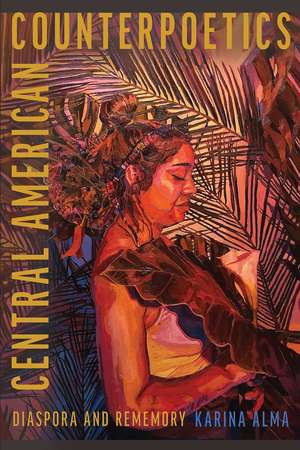Central American Counterpoetics: Diaspora and Rememory
Autor Karina Almaen Limba Engleză Paperback – 19 mar 2024
Author Karina Alma offers a systemic method and artistic mode for unpacking social and political memory formation that resists dominant histories. Central American Counterpoetics responds to political repression through acts of creativity that prioritize the well-being of anticolonial communities. Building on Toni Morrison’s theory of rememory, the volume examines the concept as an embodied experience of a sensory place and time lived in the here and now. By employing primary sources of image and word, interviews of creatives, and a critical self-reflection as a Salvadoran immigrant woman in academia, Alma’s research breaks ground in subject matter and methods by considering cultural and historical ties across countries, regions, and traditions. The diverse creatives included explore critical perspectives on topics such as immigration, forced assimilation, maternal love, gender violence, community arts, and decolonization.
Preț: 239.73 lei
Nou
Puncte Express: 360
Preț estimativ în valută:
45.87€ • 49.05$ • 38.25£
45.87€ • 49.05$ • 38.25£
Carte disponibilă
Livrare economică 27 martie-10 aprilie
Preluare comenzi: 021 569.72.76
Specificații
ISBN-13: 9780816552566
ISBN-10: 0816552568
Pagini: 224
Ilustrații: 5 b&w illustrations, 14 color illustrations
Dimensiuni: 152 x 229 x 15 mm
Greutate: 0.36 kg
Editura: University of Arizona Press
Colecția University of Arizona Press
ISBN-10: 0816552568
Pagini: 224
Ilustrații: 5 b&w illustrations, 14 color illustrations
Dimensiuni: 152 x 229 x 15 mm
Greutate: 0.36 kg
Editura: University of Arizona Press
Colecția University of Arizona Press
Notă biografică
Karina Alma is an assistant professor in the Chicano/a and Central American Studies Department at University of California, Los Angeles, and a co-editor of U.S. Central Americans: Reconstructing Memories, Struggles, and Communities of Resistance.
Cuprins
Preface
Overview and Process
Historical Context: Central American Studies as a Field
Chapter 1: Methods Matter: Emergence of U.S. Central American Counterpoetics
Chapter 2: Counterpoetic Crossings the 60s to Transborder 90s
Chapter 3: Counterpoetics Against the Fiction of the Central American Humanish
Chapter 4: Remembory 530 Years of Defiance and Laughter
Chapter 5: Amplifying Renewal, 1.5 and Second Gen Counterpoetics
Chapter 6: Immigrant Women Memory Keepers and PTG pedagogical Counterpoetics Coda
Overview and Process
Historical Context: Central American Studies as a Field
Chapter 1: Methods Matter: Emergence of U.S. Central American Counterpoetics
Chapter 2: Counterpoetic Crossings the 60s to Transborder 90s
Chapter 3: Counterpoetics Against the Fiction of the Central American Humanish
Chapter 4: Remembory 530 Years of Defiance and Laughter
Chapter 5: Amplifying Renewal, 1.5 and Second Gen Counterpoetics
Chapter 6: Immigrant Women Memory Keepers and PTG pedagogical Counterpoetics Coda
Recenzii
“This comprehensive and innovative study provides a new iteration of theory in the flesh in a Central American diasporic context. Alma celebrates and presents our perspectives and privileges our voices. Alma takes care to include critical context and framing. She credits and codifies the different phases and people that have contributed to the building of Central American studies. She invokes the historic and pioneering work of Chicanx, African American, and BIPOC activists and scholars while naming the legacy of white supremacy and colonialism. She focuses on acts of resistance that portray embodied survivors and practitioners in areas as diverse as cumbia, literature, community medicine, and comedic performance.”—Leticia Hernández-Linares, author of Mucha Muchacha, Too Much Girl: Poems
Descriere
Connecting past and present, this book proposes the concepts of rememory (rememoria) and counterpoetics as decolonial tools for studying the art, popular culture, literature, music, and healing practices of Central America and the diaspora in the United States. Building on the theory of rememory articulated in Toni Morrison’s Beloved, the volume examines the concept as an embodied experience of a sensory place and time lived in the here and now. By employing a wide array of sources, Alma’s research breaks ground in subject matter and methods, considering cultural and historical ties across countries, regions, and traditions while offering critical perspectives on topics such as immigration, forced assimilation, maternal love, gender violence, community arts, and decolonization.
